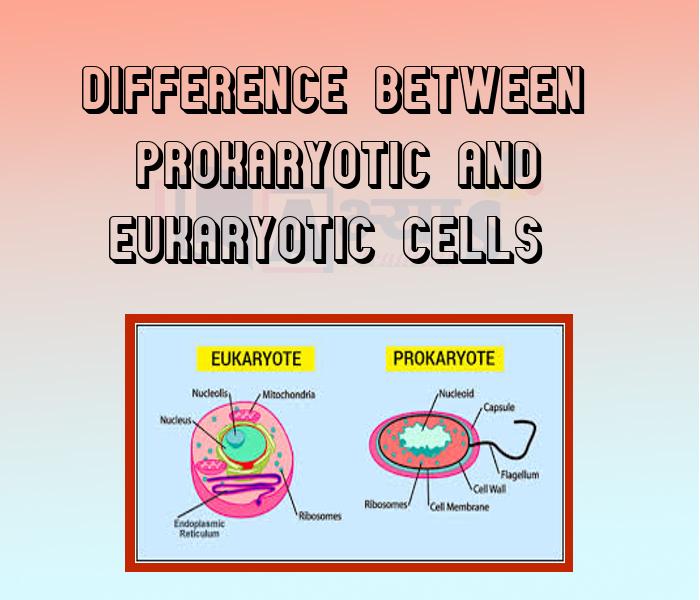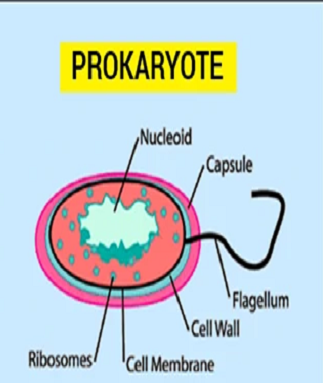Difference between Prokaryotic and Eukaryotic Cells












Difference between Prokaryotic and Eukaryotic Cells
All living organisms are made up of cells. And based on the kind of cells they are made up of, they are divided into two groups: ‘prokaryotes’ and ‘eukaryotes’. Organisms whose cells lack a nuclear membrane are called Prokaryotes (Pro = primitive and Karyon = Nucleus). Examples of prokaryotes are bacteria and blue-green algae. The organisms with cells having well defined nucleus are called Eukaryotes. They are further divided into Plant Cell and Animal Cell. Prokaryotic cells divide by the method of binary fission and budding. Binary fission is the process of division in which cell divide and give rise to two daughter cells. Budding on the other hand is the process in which new organism develop from an outgrowth and bud.
|
Feature |
Prokaryotic Cell |
Eukaryotic Cell |
|
1. Size |
Size generally small (1-10) µ m: 1 µ m = 10-6 m |
Size generally large (10-100) µ m |
|
2. Nuclear region |
Lacks nuclear membrane and nuclear region. |
Well defined & surrounded by a double layered nuclear membrane. |
|
3. Chromosome |
Single |
More than one. |
|
4. Cell Organelles |
Membrane bound cell organelles absent. |
Membrane bound cell organelles present. like mitochondria, plastids etc |
|
5. Organisms |
Found in bacteria, blue green algae etc |
Found in fungi, plants and animals |
 |
 |
A common feature between prokaryotic and eukaryotic cell is __________________ | |||
| Right Option : C | |||
| View Explanation | |||
Organisms having well defined nucleus membrane are known as ________________ | |||
| Right Option : C | |||
| View Explanation | |||
_____________is a prokaryotic cell | |||
| Right Option : B | |||
| View Explanation | |||
Students / Parents Reviews [10]
It has a great methodology. Students here can get analysis to their test quickly.We can learn easily through PPTs and the testing methods are good. We know that where we have to practice

Barkha Arora
10thIt was a good experience with Abhyas Academy. I even faced problems in starting but slowly and steadily overcomed. Especially reasoning classes helped me a lot.

Cheshta
10thMy experience with Abhyas is very good. I have learnt many things here like vedic maths and reasoning also. Teachers here first take our doubts and then there are assignments to verify our weak points.

Shivam Rana
7thAbout Abhyas metholodology the teachers are very nice and hardworking toward students.The Centre Head Mrs Anu Sethi is also a brilliant teacher.Abhyas has taught me how to overcome problems and has always taken my doubts and suppoeted me.

Shreya Shrivastava
8thIt was good as the experience because as we had come here we had been improved in a such envirnment created here.Extra is taught which is beneficial for future.

Eshan Arora
8thBeing a parent, I saw my daughter improvement in her studies by seeing a good result in all day to day compititive exam TMO, NSO, IEO etc and as well as studies. I have got a fruitful result from my daughter.

Prisha Gupta
8thMy experience with Abhyas academy is very good. I did not think that my every subject coming here will be so strong. The main thing is that the online tests had made me learn here more things.

Hiya Gupta
8thAbhyas is a complete education Institute. Here extreme care is taken by teacher with the help of regular exam. Extra classes also conducted by the institute, if the student is weak.

Om Umang
10thI have spent a wonderful time in Abhyas academy. It has made my reasoning more apt, English more stronger and Maths an interesting subject for me. It has given me a habbit of self studying

Yatharthi Sharma
10thMy experience was very good with Abhyas academy. I am studying here from 6th class and I am satisfied by its results in my life. I improved a lot here ahead of school syllabus.
